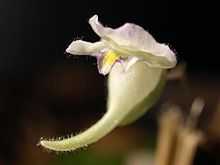Utricularia jamesoniana
From Wikipedia, the free encyclopedia
| Utricularia jamesoniana | |
|---|---|
 | |
| Scientific classification | |
| Kingdom: | Plantae |
| (unranked): | Angiosperms |
| (unranked): | Eudicots |
| (unranked): | Asterids |
| Order: | Lamiales |
| Family: | Lentibulariaceae |
| Genus: | Utricularia |
| Subgenus: | Utricularia |
| Section: | Orchidioides |
| Species: | U. jamesoniana |
| Binomial name | |
| Utricularia jamesoniana Oliv. | |
| Synonyms | |
| |
Utricularia jamesoniana is a small perennial epiphyte carnivorous plant that belongs to the genus Utricularia. U. jamesoniana is native to Central America, the Antilles, and northern and western South America. It can be found in Bolivia, Brazil, Colombia, Costa Rica, Ecuador, French Guiana, Guatemala, Guyana, Nicaragua, Panama, Peru, Suriname, and Venezuela and on the islands of Guadeloupe, Hispanola, Dominica, and Martinique. It was originally published and described by Daniel Oliver in 1860. Its habitat is reported as being mossy tree trunks in montane cloud forests or lowland rain forests at altitudes from sea level to 2,500 m (8,202 ft). It flowers year-round.[1]
See also
References
- ↑ Taylor, Peter. (1989). The genus Utricularia - a taxonomic monograph. Kew Bulletin Additional Series XIV: London.
External links
![]() Media related to Utricularia jamesoniana at Wikimedia Commons
Media related to Utricularia jamesoniana at Wikimedia Commons
This article is issued from Wikipedia. The text is available under the Creative Commons Attribution/Share Alike; additional terms may apply for the media files.